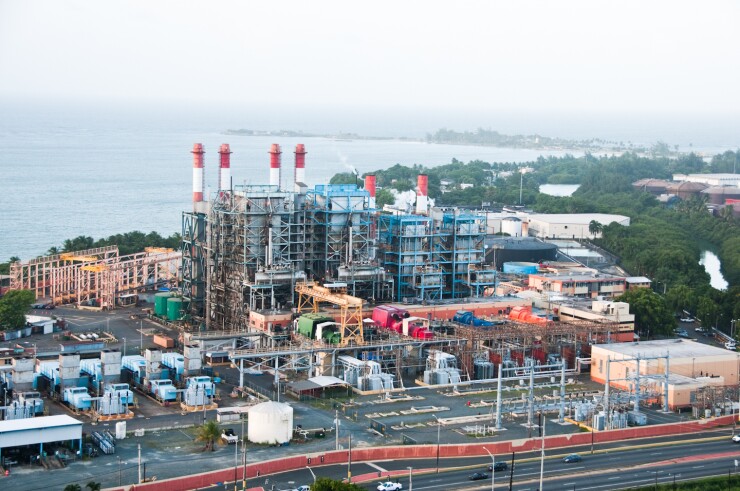The Puerto Rico government is arguing with unsecured creditors about whether the Puerto Rico Electric Power Authority bankruptcy judge should consider a report on the impact of the PREPA debt restructuring deal.
The Unsecured Creditors Committee commissioned consultant London Economics International to do the study, “Critique of Government Parties Assertions that the 9019 Settlement Will Not Affect Non-Settling Creditors and Will Avoid a Subsequent Title III Filing by PREPA.” London Economics released the study, which says that PREPA is in a difficult position and is facing major obstacles in the future, in October.

There have been arguments between the Oversight Board and the Puerto Rico Fiscal Agency and Financial Advisory Authority, on the one hand, and the Unsecured Creditors Committee, on the other, since then on whether the study can be entered into evidence.
On Jan. 28 Magistrate Judge Judith Dein ordered that most of the report be made public, citing bankruptcy laws about making documents public. She ordered a small section of the document be redacted. The section is an operation and maintenance agreement between PREPA and an operator of the transmission and distribution system and is confidential commercial information.
On Jan. 31 the board published the redacted version of the report in bankruptcy filing seeking to have it excluded from evidence. In their court filings, the board and FAFAA say that Title III bankruptcy court has already said that evidence about the proposed restructuring’s economic effects or its sustainability of rate increases are beyond the court’s scope of interest. The judges in the PREPA bankruptcy have yet to rule on the admissibility of the report into the bankruptcy.
On Nov. 14 attorneys for the Unsecured Creditors gave five reasons for the court to consider the London Economics report as evidence. First, they said that the report provides evidence that the proposed PREPA settlement will not help the authority avoid a subsequent Title III bankruptcy filing.
Second, by addressing this topic it covers the value of the proposed settlement to PREPA, which judges in the Jeffrey v. Desmond case said was important.
Third and also following Jeffrey, the report provides evidence on how the settlement will affect the interests of the creditors.
Fourth, the lawyers say that bankruptcy Judge Laura Taylor Swain's rulings saying the PREPA settlement hearing should have a narrow range of topics doesn't preclude consideration of the report. This was because Swain's rulings were on discovery and not evidentiary issues or dealt with different sorts of evidence.
Fifth, the attorneys said that consideration of the report wouldn't excessively slow the litigation since only one other party has submitted an expert report.
The report
The London Economics report says that PREPA is in a difficult position and is facing major obstacles in the future. It asserts that the proposed debt deal with an initial 2.77 cent per kilowatt-hour surcharge, which is later to rise gradually to 4.55 cents/kwh, would curtail residents’ demand for electricity.
This, in turn, would force PREPA to increase rates on its smaller demand base to recover its cost of service and the debt surcharge. That would lead to further declines in demand, forcing the authority to increase rates further.
London Economics projects that the authority’s paid electrical consumption would drop 70% by fiscal 2047, compared to the present. It also projects that the authority would have to raise rates annually by 2.9% and 5% through fiscal 2047, substantially higher than what it expects the inflation rate to be in those years.
A person associated with PREPA bondholders told The Bond Buyer, “It’s really easy to make an economic report say whatever you want.” To understand the report, one needs to look at who financed it, he said.
The study fails to include offsetting assumptions like the savings that privatizing parts of the authority would bring to it, the person said.
Power consumption is running substantially ahead of projections, a positive sign for the authority’s economic viability, he said.
The board’s stated goal of 20 cents per kw/h rate is unrealistic, the source said. Rates in all Caribbean islands are much higher than this and this suggests there is plenty of space for rate increases to pay the debt.
Cate Long, who does research for Puerto Rico bondholder groups, said, “Just like feasibility studies are commissioned to support bond issuance, it is relatively easy to concoct analysis that covers long periods of time and skews the results in a desired direction.”
Long said she questioned the report’s assumption that the price of liquefied natural gas would go up by 28% by 2030. She said a June 2019 McKinsey report projected the price to remain stable in the period as additional supplies came onto the market.
Long said the report is projecting that PREPA will transition to getting nearly all of its electricity from natural gas and solar, so this assumption would have a big impact.





